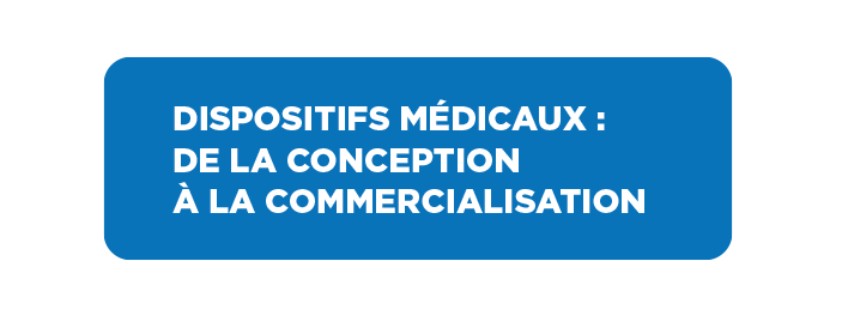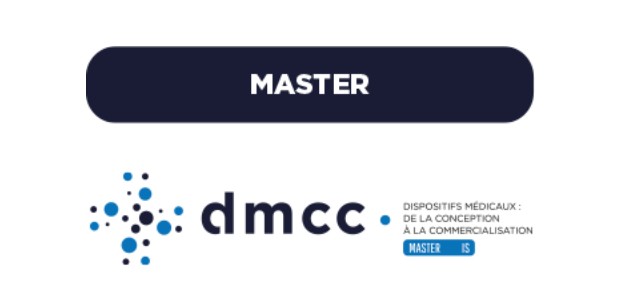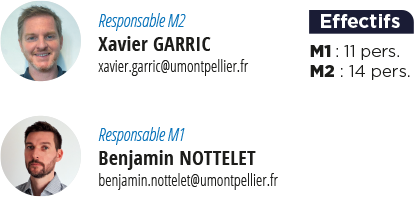DMCC dispositifs médicaux de la conception à la commercialisation


UNE FORMATION TRANSVERSALE POUR UNE CONNAISSANCE APPROFONDIE DU SECTEUR DU DISPOSITIF MÉDICAL ET UNE INSERTION RAPIDE ET EFFICACE DANS LE MONDE PROFESSIONNEL.
OBJECTIFS
Former des cadres spécialistes en conception, évaluation, production et règlementation des dispositifs médicaux – Faire acquérir aux étudiants les savoirs de haut niveau pour leur spécialisation dans le domaine du dispositif médical – Développer les capacités d’adaptation à l’environnement scientifique, industriel et sociétal. – Favoriser l’employabilité des diplômés par une formation académique et en alternance. – Proposer un enseignement interactif : learning Lab, cours inversés, séminaire interactif, visite d’entreprise, apprentissage par projet…Les plus du parcours DMCC
- Des Apprentissages Par Projet (APP) basés sur des besoins cliniques réels de patients, de cliniciens, et d’entreprises du DM
- Plus de 35 intervenants industriels et cliniciens qui basent leurs enseignements sur leur activité professionnelle quotidienne
- Un accès au réseau DISCORD de tous les diplômés du Master DMCC pour échanger sur les problématiques du secteur du dispositif médical
- Accès au site Qualitiso pendant la période de formation à la faculté.
- Une journée d’anciens pour préparer à l’insertion professionnelle
- Des visites d’entreprises et laboratoires de recherche en lien avec le secteur du DM (Dedienne Santé, Womed…)
- Intégration au réseau de l’Institut de l’Innovation sur les Dispositifs médicaux
- Participation à l’événement After Hours Innovation (Vulgarisation de dispositifs médicaux innovants)
- Une équipe restreinte d’enseignants-chercheurs spécialistes du domaine et fortement impliqués pour un accompagnement personnalisé vers une intégration professionnelle.
- Une formation en apprentissage suivant un calendrier maximisant le temps passé en entreprise
CONNAISSANCES SPÉCIFIQUES APPORTÉES PAR LE PARCOURS
- Synthèse, caractérisation, évaluation et mise en forme des biomatériaux
- Connaissance générale des applications des dispositifs médicaux par discipline
médicale - Connaissances approfondies des contraintes réglementaires et économiques du
marché du DM - Process d’innovation des dispositifs médiaux
- Réglementation des dispositifs médicaux
- Evaluation clinique et préclinique des dispositifs médicaux
- Système de management de la qualité
- Gestion de production
- Marketing et business development
- Post-Marketing Surveillance
COMPÉTENCES SPÉCIFIQUES APPORTÉES PAR LE PARCOURS
Compétences pour une insertion professionnelle dans les métiers à responsabilités du secteur cible des dispositifs médicaux :
- Identifier un besoin clinique et définir les spécifications d’un dispositif
médical innovant - Capacité à concevoir un dispositif médical à partir de bases scientifiques
et techniques sur les biomatériaux - Rédiger un dossier de conception et un dossier technique de marquage CE
- Planifier les étapes de développement, d’évaluation et d’industrialisation
d’un dispositif médical - Mettre en place une analyse de risques liée au cycle de vie d’un dispositif
médical - Maitriser les spécificités du dispositif médical tout au long de son cycle de
vie dans l’entreprise (R&D, Production, Réglementation, Qualité,
Marketing…)
MOYENS PÉDAGOGIQUES ET intervenants
Espace Pédagogique d’Impression 3D en Santé. Learning Lab, cours inversé, séminaires interactifs, visite d’entreprise, apprentissage par projet…
Nombreux intervenants professionnels extérieurs :
- Spécialistes de l’innovation dans le domaine des dispositifs médicaux et
des biomatériaux (Chercheurs et enseignants-chercheurs) - Professeurs associés avec activité industrielle dans le domaine du DM
- Praticiens hospitaliers (PU-PH, MCU-PH, PH et chef de clinique)
- Institutionnels (HAS, CNEDIMTs, CEPS..)
- Industriels experts des différents secteurs du dispositif médical :
o Affaires Réglementaires
o Système de management la qualité
o Production
o Evaluations pré-cliniques et clinques
o Business Développement
o Marketing
M1 + M2 ouverts à l’apprentissage, calendriers adaptés pour optimiser la formation pratique
métiers :
Les débouchés du parcours sont majoritairement dans le secteur des dispositifs médicaux (PME, TPE, ETI ou grands groupes) en tant que chef de projet et responsable en :
• R&D
• Production
• Affaires Réglementaires
• Qualité
• Evaluations pré-cliniques et cliniques des dispositifs médicaux
Aurora nous explique son métier de cheffe de produit junior dans le domaine du dispositif médical. Pour en savoir plus sur ces métiers : sur instagram : @mon_metier_dans_le_dm
Vidéo : entretien avec une étudiante en alternance dans le cadre de INSIDE IS ISMA
Télécharger la fiche du parcours



